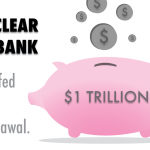5 Myths about America’s Nuclear Weapons Debunked By Phillip Coyle, Robert Gard, John Isaacs, & Greg Terryn The Bulletin of Atomic Scientists announced last week that it has decided to move its famed “Doomsday Clock” three minutes closer to midnight or, in effect, closer to the “end of humanity.” While this year, the Bulletin focused […]
News Flash: Nuclear Weapons Still Expensive
The Congressional Budget Office’s Report on the Projected Costs of U.S. Nuclear Forces has again undercut the tired myth that our current nuclear weapon plans are inexpensive. According to the report, the administration’s plan for modernizing the nuclear triad is expected to cost $348 billion over the next decade, an average of about $35 billion a year. But these costs reflect only the tip of the budgetary iceberg. Reports such as the National Defense Panel Review of the 2014 Quadrennial Defense Review and the Trillion Dollar Triad estimate the entire modernization plan will likely cost $1 trillion over the next 30 years.
Letter to Susan Rice Opposing Long-Range Stand-Off Weapons
Executive Director Angela Canterbury and Senior Fellows John Isaacs and Lt. General Robert Gard signed onto a letter urging the National Security Advisor to recommend canceling the Long-Range Stand-Off weapon program.. January 26, 2015 The Honorable Susan Rice National Security Advisor The White House Washington DC 20500 Dear Ambassador Rice, We write to express our […]
FACTSHEET: US nuclear weapons total inventory more than 7,000
Proponents of nuclear weapons tend to downplay the number of nuclear weapons the United States possesses to forward their ‘we don’t have nukes to spare’ agenda. While it is true that according to the parameters of the New START treaty the US has 1,642 deployed nuclear warheads, this figure does not take into consideration the thousands of other nuclear weapons in our stockpile or awaiting dismantlement.



